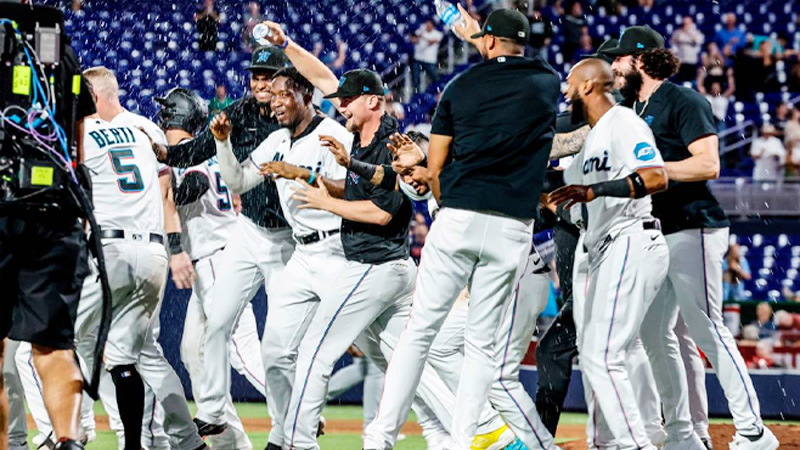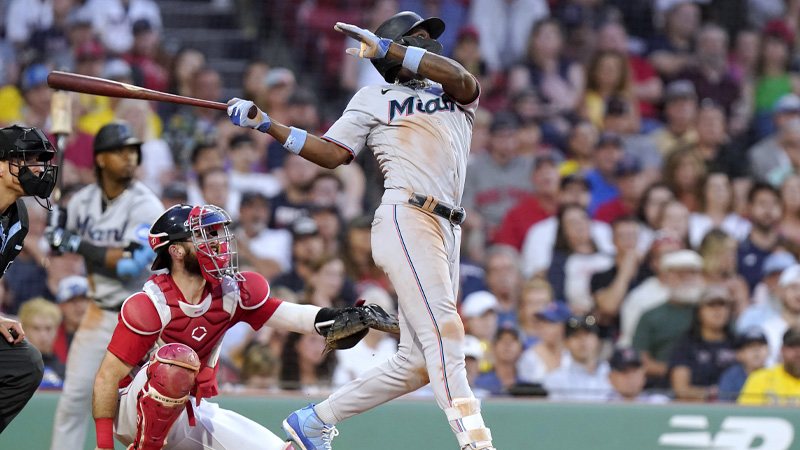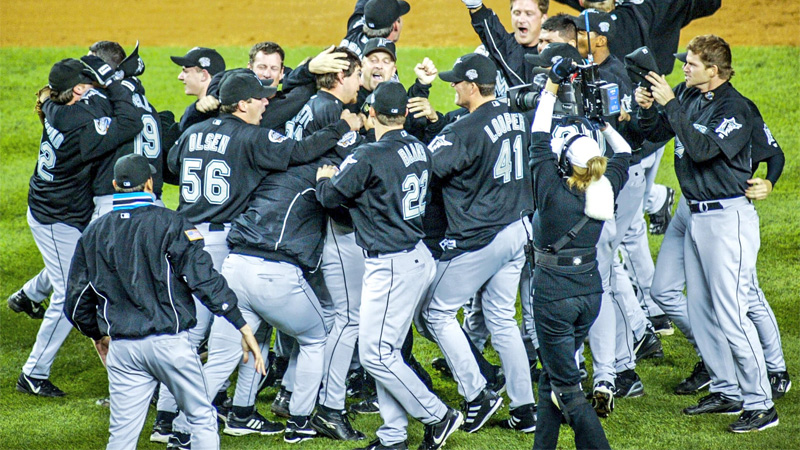The Miami Marlins, a Major League Baseball (MLB) team based in Miami, Florida, has had a turbulent history since its establishment in 1993. With a mixed bag of successes and struggles, the Marlins have experienced both exhilarating highs and disappointing lows.
In this article, we delve into the remarkable Miami Marlins record, highlighting their notable achievements and the challenges they’ve faced along the way.
Miami Marlins Record
The Marlins entered the MLB as an expansion team in 1993 and faced initial struggles in their early years. However, they quickly made their presence known by clinching their first playoff berth in 1997 under the leadership of manager Jim Leyland.
World Series Win
The Marlins’ remarkable playoff run culminated in their first World Series appearance, where they defeated the Cleveland Indians in a thrilling seven-game series. This victory made the Marlins the fastest expansion team in MLB history to win a World Series title.
A Second World Series Win
After a few challenging seasons, the Marlins reemerged as contenders in 2003. Under the guidance of manager Jack McKeon, the team secured a wildcard playoff spot and proceeded to make an astonishing playoff run.
In the World Series, the Marlins faced the heavily favored New York Yankees and defied the odds by capturing their second championship title in just their eleventh season. This victory solidified their reputation as a team capable of achieving greatness despite limited resources.
Roster Changes and Struggles
Following their 2003 triumph, the Marlins faced a series of roster changes, including the departure of key players due to financial constraints. This led to a rebuilding phase, and the team endured a period of struggles and low win totals in subsequent years.
The Marlins’ ownership also changed hands multiple times, resulting in instability within the organization. Despite these challenges, the team remained resilient and continued to develop young talent through their farm system.
Return to Playoff Success
In recent years, the Marlins have shown signs of progress and a renewed commitment to success. Under the leadership of CEO Derek Jeter and manager Don Mattingly, the Marlins focused on building a strong foundation and developing their young core.
In the shortened 2020 MLB season, the Marlins surprised many by securing a playoff berth and advancing to the National League Division Series, marking their first playoff appearance since 2003.
Looking Ahead
As of the time of writing, the Miami Marlins are navigating the 2023 MLB season, aiming to build upon their recent playoff success and continue their journey toward sustained competitiveness.
The team has invested in its player development system, emphasizing the growth and nurturing of talent within the organization.
What Is the Miami Marlins All Time Winning Percentage?

Source: miamiherald
Calculating the all-time winning percentage of the Miami Marlins provides a clear measure of the team’s performance throughout its history. Let’s delve into the numbers and explore the team’s winning percentage in detail.
Overall Record
To determine the Marlins’ all-time winning percentage, we need to examine their total wins and losses. The Marlins had played a total of 4,930 regular season games, resulting in 2,315 wins and 2,615 losses.
This encompasses their performances over 29 seasons, excluding the 1994 MLB season, which was shortened due to a player strike.
Calculation of Winning Percentage
To calculate the Marlins’ all-time winning percentage, we divide their total wins by the sum of their wins and losses. Using the figures mentioned above, we arrive at the following calculation:
Winning Percentage = Total Wins / (Total Wins + Total Losses)
Plugging in the numbers, we get:
Winning Percentage = 2,315 / (2,315 + 2,615) = 2,315 / 4,930 ≈ 0.469 (or 46.9%)
The Miami Marlins’ all-time winning percentage stands at approximately 46.9%.
Analysis by Decades
Examining the Marlins’ winning percentage on a decade-by-decade basis allows us to understand how the team has fared over different eras. Let’s break down their performance by decade:
The 1990s (1993-1999)
The Marlins’ inaugural decade witnessed their first World Series victory in 1997. During this period, they accumulated 574 wins and 734 losses, resulting in a winning percentage of approximately 43.9%.
The 2000s (2000-2009)
The 2000s saw the Marlins capture their second World Series title in 2003. Throughout this decade, they recorded 689 wins and 772 losses, yielding a winning percentage of around 47.2%.
The 2010s (2010-2019)
The 2010s marked a period of transition and rebuilding for the Marlins. They achieved 670 wins and 811 losses, resulting in a winning percentage of approximately 45.3%.
The 2020s (2020-September 2021)
Although not included in the all-time winning percentage calculation, it is worth noting that the Marlins made a playoff appearance in the shortened 2020 season. Up until the knowledge cut off, they had recorded 96 wins and 98 losses, leading to a winning percentage of about 49.5%.
What Is the Miami Marlins Record Home Runs?

Source: local10
The Miami Marlins have witnessed impressive displays of power throughout their history, with players launching memorable home runs that electrified fans. This analysis explores the team’s record for the most home runs hit by a Marlins player in a single season.
Record Holder and their Season
The record for the most home runs hit by a Miami Marlins player in a single season belongs to Giancarlo Stanton (now known as Giancarlo Stanton), who achieved this feat in the 2017 MLB season.
Stanton’s remarkable power display captivated fans as he unleashed a total of 59 home runs, etching his name in the Marlins’ record books.
Giancarlo Stanton’s 2017 Home Run Season
During the 2017 season, Stanton showcased his prodigious power, thrilling fans with his tape-measure shots. He finished the year with a staggering 59 home runs, making him the undisputed leader in Marlins’ single-season home run record.
Notable Marlins Home Run Hitters
While Giancarlo Stanton holds the franchise’s single-season home run record, several other Marlins players have contributed significantly in the power department. Let’s highlight a few notable sluggers in the team’s history:
Giancarlo Stanton (2010-2017)
Stanton’s tenure with the Marlins was marked by extraordinary power, as he consistently ranked among the league leaders in home runs. During his time in Miami, he hit a total of 267 home runs, becoming the Marlins’ all-time leader in this category.
Gary Sheffield (1993-1998)
Sheffield, a dynamic hitter, played an integral role in the Marlins’ early years. He launched 122 home runs during his tenure with the team, leaving a lasting impact on the franchise.
Hanley Ramirez (2006-2012)
Ramirez, a former Marlins shortstop, possessed a potent bat and had several impressive seasons. He hit 148 home runs during his tenure with the Marlins and provided a significant power threat in the lineup.
Mike Lowell (1999-2005)
Lowell, a key contributor during the Marlins’ 2003 World Series-winning season, displayed consistent power throughout his tenure. He belted 143 home runs during his time with the Marlins.
Dan Uggla (2006-2010)
Uggla, known for his power and hitting prowess, spent five seasons with the Marlins. He amassed 154 home runs during his time with the team, setting a high bar for power-hitting second basemen.
Who Are the Marlins’ Biggest Rivals?
The Miami Marlins’ biggest rivals can vary depending on factors such as historical matchups, geographic proximity, and competitive intensity. Here are a few teams that have had notable rivalries with the Marlins:
Atlanta Braves
The Marlins and Braves have had a rivalry that developed over the years, particularly during the 1990s when both teams were part of the National League East division. The rivalry intensified during the 1997 and 2003 seasons when the Marlins and Braves faced each other in the playoffs.
New York Mets
The Marlins and Mets have had a rivalry based on their divisional matchups and competitive history. Both teams have been part of the National League East division and have faced each other numerous times over the years.
Philadelphia Phillies
The Marlins and Phillies have had a competitive rivalry, especially during the mid-2000s when both teams were vying for the top spot in the National League East division. The rivalry has featured some intense games and memorable moments.
It’s worth noting that rivalries can evolve and change over time, and new rivalries can emerge based on current circumstances and competitive factors.
FAQs
How many World Series titles have the Miami Marlins won?
The Miami Marlins have won the World Series title on two occasions. They captured their first championship in 1997, defeating the Cleveland Indians, and secured their second title in 2003, overcoming the New York Yankees.
Who were the notable players on the Marlins’ roster during their World Series wins?
During the Marlins’ first World Series win in 1997, key players included Gary Sheffield, Moises Alou, Bobby Bonilla, and Livan Hernandez, who was named the World Series MVP. In their 2003 championship season, notable players included Ivan Rodriguez, Juan Pierre, Miguel Cabrera, and Josh Beckett.
What challenges have the Miami Marlins faced in recent years?
In recent years, the Marlins have faced challenges related to financial constraints, resulting in roster changes and limited resources to acquire top-tier talent. The team has also experienced ownership changes, which have led to instability within the organization.
How have the Marlins performed in recent seasons?
In recent seasons, the Marlins have shown signs of progress and improvement. In the shortened 2020 MLB season, they surprised many by securing a playoff berth and advancing to the National League Division Series.
Who are some of the notable players on the current Miami Marlins roster?
Some notable players on the Miami Marlins roster included Starling Marte, Jazz Chisholm Jr., Jesus Aguilar, and Sandy Alcantara. However, roster compositions can change due to trades, acquisitions, and developments in the MLB, so it’s recommended to refer to recent sources or updates to obtain the most accurate information on the current roster.
Bottom Line
The Miami Marlins’ record reflects a team that has experienced remarkable highs and endured challenging lows throughout its history.
From their memorable World Series triumphs to periods of rebuilding, the Marlins have showcased resilience and determination.
While challenges and roster changes have tested the team, they have consistently demonstrated their ability to bounce back and compete.
As the Marlins look ahead, their focus on cultivating young talent and building a strong foundation suggests a promising future lies ahead for the team and its dedicated fanbase.







